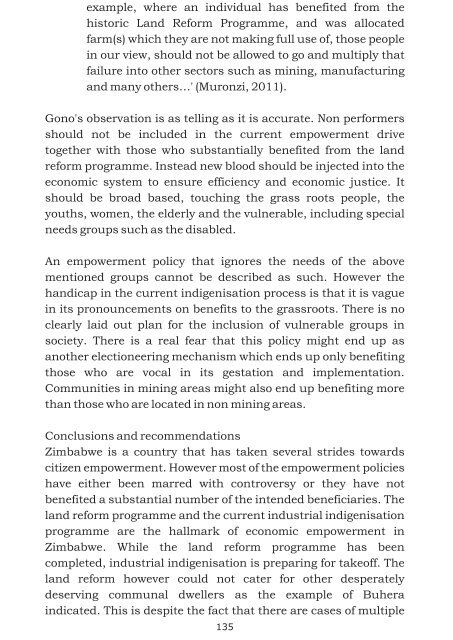Beneficiaries are actors too.pdf - Southern Institute of Peace ...
Beneficiaries are actors too.pdf - Southern Institute of Peace ...
Beneficiaries are actors too.pdf - Southern Institute of Peace ...
You also want an ePaper? Increase the reach of your titles
YUMPU automatically turns print PDFs into web optimized ePapers that Google loves.
example, where an individual has benefited from the<br />
historic Land Reform Programme, and was allocated<br />
farm(s) which they <strong>are</strong> not making full use <strong>of</strong>, those people<br />
in our view, should not be allowed to go and multiply that<br />
failure into other sectors such as mining, manufacturing<br />
and many others…' (Muronzi, 2011).<br />
Gono's observation is as telling as it is accurate. Non performers<br />
should not be included in the current empowerment drive<br />
together with those who substantially benefited from the land<br />
reform programme. Instead new blood should be injected into the<br />
economic system to ensure efficiency and economic justice. It<br />
should be broad based, touching the grass roots people, the<br />
youths, women, the elderly and the vulnerable, including special<br />
needs groups such as the disabled.<br />
An empowerment policy that ignores the needs <strong>of</strong> the above<br />
mentioned groups cannot be described as such. However the<br />
handicap in the current indigenisation process is that it is vague<br />
in its pronouncements on benefits to the grassroots. There is no<br />
clearly laid out plan for the inclusion <strong>of</strong> vulnerable groups in<br />
society. There is a real fear that this policy might end up as<br />
another electioneering mechanism which ends up only benefiting<br />
those who <strong>are</strong> vocal in its gestation and implementation.<br />
Communities in mining <strong>are</strong>as might also end up benefiting more<br />
than those who <strong>are</strong> located in non mining <strong>are</strong>as.<br />
Conclusions and recommendations<br />
Zimbabwe is a country that has taken several strides towards<br />
citizen empowerment. However most <strong>of</strong> the empowerment policies<br />
have either been marred with controversy or they have not<br />
benefited a substantial number <strong>of</strong> the intended beneficiaries. The<br />
land reform programme and the current industrial indigenisation<br />
programme <strong>are</strong> the hallmark <strong>of</strong> economic empowerment in<br />
Zimbabwe. While the land reform programme has been<br />
completed, industrial indigenisation is preparing for take<strong>of</strong>f. The<br />
land reform however could not cater for other desperately<br />
deserving communal dwellers as the example <strong>of</strong> Buhera<br />
indicated. This is despite the fact that there <strong>are</strong> cases <strong>of</strong> multiple<br />
135


